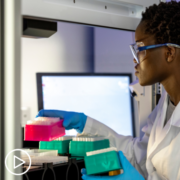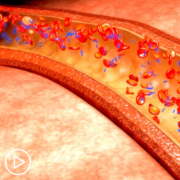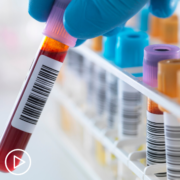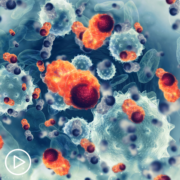CLL Genetic Markers: What Should I Ask About Prognostic Factors?
CLL Genetic Markers: What Should I Ask About Prognostic Factors? from Patient Empowerment Network on Vimeo.
What’s key for chronic lymphocytic leukemia (CLL) patients to know about genetic markers? Expert Dr. Ryan Jacobs explains genetic markers checked in standard CLL testing, questions to ask your doctor, and common treatments used with specific genetic markers.
Dr. Ryan Jacobs is a hematologist/oncologist specializing in Chronic Lymphocytic Leukemia from Levine Cancer Institute. Learn more about Dr. Jacobs.
Download Resource Guide | Descargar Guía en Español
Related Programs:

|

|

|
Transcript:
Lisa Hatfield:
“How can I ask my doctor to make sure I am being tested for serum markers?” And more broadly, I think a lot of patients are a little bit nervous about asking questions of their doctor, because they don’t want to feel like they’re questioning their expertise or doubting them. So how in general can we ask our doctor questions if we hear something? Or how can we approach our doctor with those types of questions?
Dr. Ryan Jacobs:
So I mentioned asking your doctor, “What’s my prognostic markers?” I think is probably the easiest way to get that information. And your doctor should be checking those. The question comes up like, what are the “high-risk” markers? We talked about mutated versus unmutated. Thankfully, our novel treatments, that doesn’t seem to matter. Same goes with…there’s on FISH there used to be, if you found three copies of chromosome 12, that’s called trisomy 12, that doesn’t seem to matter with our newer treatments. A deletion at chromosome 11, again, used to not do as well with chemo. Novel therapies, doesn’t seem to matter.
The one that is still potentially affecting outcomes, even with our novel treatments, are chromosome 17 aberrations, which stately are rare in the initial diagnostic setting, that or a TP53. A deletion at 17p or TP53 mutation probably is only going to be around 10 percent of patients or so. And in the relapse setting though, that number goes up because of the more aggressive cancers emerge, we call that clonal evolution. So maybe in the 20-ish percent range. These patients, we tend to prioritize indefinite therapies first, because it seems like these patients do better if you keep treatment going, as opposed to interrupted therapies like venetoclax (Venclexta). And so we tend to treat those patients with a drug like acalabrutinib (Calquence) or zanubrutinib (Brukinsa) first and then think about the venetoclax later for those patients.
Lisa Hatfield:
Okay. Okay. And just to clarify, for patients too, I know that a lot of cancers, there are discussions about the 17 deletion, 17p, and then also the TP53 gene. So if I understand correctly, the TP53 gene is housed on chromosome number 17. So if that is missing, then that patient may be missing that gene, that is it considered a tumor suppressor gene, which we want. Is that correct?
Dr. Ryan Jacobs:
Right. So it’s either missing, which is what we see on FISH with a deletion, or it can be mutated and that’s the next gen sequencing, and often it will be both in those patients. We think with indefinite, there’s some really good data that was just released with zanubrutinib. When they looked at 17p-deleted patients, there’s some long-term follow-up with ibrutinib-treated 17p-deleted patients. With chemo these patients would only get about a year or so, but we’re getting maybe even close to normal outcomes with long-term BTK. But we do know if you just give them a year of venetoclax and obinutuzumab (Gazyva) for six months and then stop, they do relapse quicker than the other patients. So they relapse after about four years. As opposed to with five years of follow-up with that first-line venetoclax approach, there are 62 percent of patients who are still free of progression.










